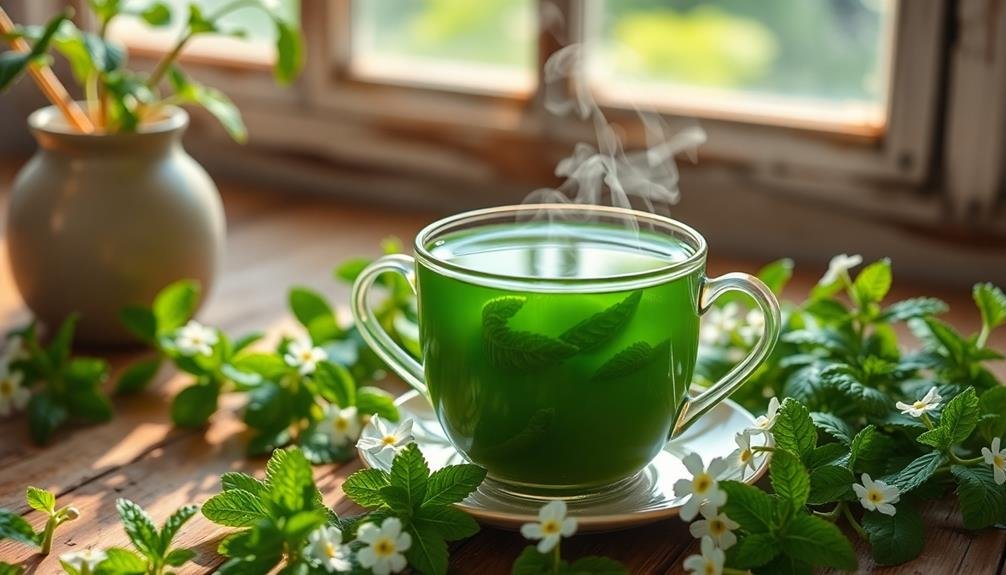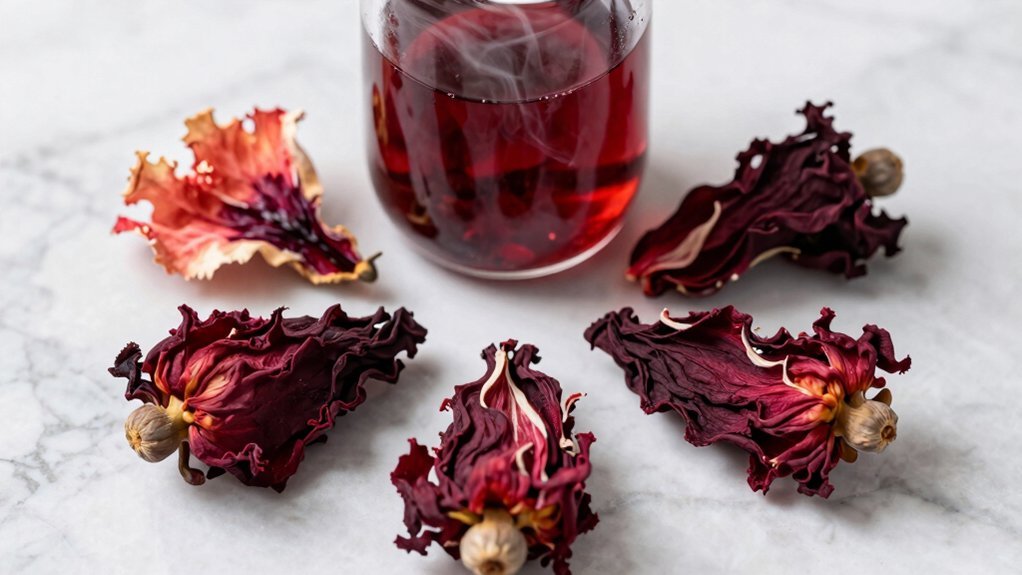If you're looking for relief from menopause symptoms, herbal teas can be your best friend. Try sage tea to reduce hot flashes and improve sleep. Red clover tea may help stabilize mood swings, while peppermint offers a revitalizing way to ease bloating and stress. Chamomile is perfect for calming anxiety, and Dong Quai can support hormonal balance. Licorice root tea might regulate estrogen levels, and ashwagandha helps reduce stress. Nettle leaf and raspberry leaf teas are great for added nutrients. Explore these delicious options, and you just might find the perfect brew for your relief. There's so much more to discover!
Sage Tea

Sage tea is a powerful herbal remedy that many women turn to for relief from menopause symptoms. This aromatic tea, made from the leaves of the sage plant, offers a range of benefits that may help ease your discomfort. You might find that sage tea helps reduce hot flashes and night sweats, which are common during menopause.
Drinking sage tea can also support hormonal balance, as it contains compounds that may mimic estrogen in your body. This can lead to a reduction in mood swings and irritability often experienced during this change.
Plus, sage is known for its calming properties, which can help alleviate anxiety and promote better sleep.
To prepare sage tea, simply steep dried sage leaves in boiling water for about 5 to 10 minutes. You can sweeten it with honey or add lemon for extra flavor. Aim to drink a cup or two daily, and you could notice improvements in your menopause symptoms over time.
Always consult with a healthcare provider before starting any new herbal remedy, especially if you're taking other medications. Embracing sage tea as part of your routine might just offer the relief you need.
Red Clover Tea
Red Clover tea offers several benefits that can help ease menopause symptoms, making it a great addition to your routine.
If you're curious about how to prepare this herbal tea and get the most out of it, you're in the right place.
Let's explore its advantages and some helpful usage tips.
Benefits of Red Clover
Many people turn to red clover tea for its potential benefits in alleviating menopause symptoms. This herbal remedy is known for its high content of isoflavones, plant compounds that can mimic estrogen in the body.
As you navigate through menopause, red clover might help ease some of those uncomfortable symptoms.
Here are a few benefits you might experience:
- Hot Flashes Relief: Red clover has been linked to a reduction in the frequency and intensity of hot flashes, making those uncomfortable moments more manageable.
- Improved Mood: Some studies suggest that red clover may help stabilize mood swings, allowing you to feel more balanced during this changeable period.
- Bone Health Support: The isoflavones in red clover may also contribute to maintaining bone density, which is especially important as estrogen levels decline during menopause.
Incorporating red clover tea into your daily routine could be a simple and natural way to tackle some menopause symptoms.
As with any herbal remedy, it's best to consult with a healthcare professional before adding it to your regimen.
Preparation and Usage Tips
When you're ready to brew a cup of red clover tea, it's important to know the best preparation methods to get the most benefits. Start with high-quality dried red clover flowers, which you can find at health food stores or online. Use about 1 to 2 teaspoons of the dried flowers per cup of boiling water.
Boil water and pour it over the red clover in a teapot or a cup. Cover it to trap the steam and let it steep for about 10 to 15 minutes. This allows the beneficial compounds to infuse into the water. If you prefer a stronger flavor, you can steep it longer, but don't exceed 20 minutes to avoid bitterness.
Once steeped, strain the tea to remove the flowers, and feel free to add honey or lemon for extra taste. Drink it once or twice daily for the best results.
You can also experiment with combining red clover with other herbs like chamomile or peppermint for added flavor and benefits. Remember to consult with a healthcare professional before making it a regular part of your routine, especially if you're on medication. Enjoy your soothing cup!
Peppermint Tea

Peppermint tea can be a rejuvenating ally during menopause, especially when it comes to managing those pesky hot flashes.
Its natural properties also support digestive health, helping you feel more comfortable overall.
Plus, sipping on this aromatic tea might just lift your mood when you need it most.
Benefits for Hot Flashes
Hot flashes can be one of the most uncomfortable symptoms of menopause, but peppermint tea offers a revitalizing way to find relief. This invigorating herbal tea not only soothes your senses but also helps cool your body from within. When you sip on peppermint tea, you're embracing a natural option that can ease these sudden bursts of heat.
Here are some benefits of peppermint tea for hot flashes:
- Cooling Effect: The menthol in peppermint can create a cooling sensation, which may help alleviate the intensity of hot flashes.
- Relaxation: The aroma and flavor of peppermint can promote relaxation and reduce stress, which can be triggers for hot flashes.
- Hormonal Balance: Some studies suggest that peppermint can help regulate hormones, potentially reducing the frequency and severity of hot flashes.
Incorporating peppermint tea into your daily routine might just be the comforting solution you need.
Whether enjoyed hot or iced, it can be a delightful way to combat those uncomfortable moments and bring a sense of calm during this change.
Digestive Health Support
For those experiencing digestive discomfort during menopause, peppermint tea can be a soothing ally. Its natural compounds can help relieve bloating, gas, and indigestion, making it a great choice for when your stomach feels unsettled.
The menthol in peppermint has muscle-relaxing properties that can ease the tension in your digestive tract, promoting smoother digestion.
When you sip on peppermint tea, you're not just enjoying a revitalizing beverage; you're also giving your digestive system a gentle nudge. It's particularly beneficial if you're dealing with changes in digestion during menopause, as hormonal fluctuations can often lead to gastrointestinal issues.
Drinking a cup after meals can help you feel more comfortable and less bloated.
Additionally, peppermint tea is caffeine-free, making it a perfect option for evenings when you want to relax without the jitters. Its pleasant aroma and flavor can elevate your mood while simultaneously supporting your digestive health.
Incorporating peppermint tea into your daily routine can be a simple yet effective way to tackle those uncomfortable digestive symptoms during menopause, allowing you to feel more at ease in your body.
Mood Enhancement Properties
When you're feeling overwhelmed by the emotional ups and downs of menopause, a cup of peppermint tea can lift your spirits. This invigorating herbal tea isn't just a delightful beverage; it also offers mood-enhancing properties that can make a significant difference in your day-to-day life. The aroma and taste of peppermint can stimulate your senses, providing a burst of energy and clarity.
Here are some reasons why peppermint tea can help elevate your mood:
- Aromatherapy Benefits: The scent of peppermint has been shown to reduce stress and promote relaxation, helping you feel more at ease.
- Natural Energy Booster: Instead of crashing from caffeine, peppermint tea provides a gentle lift, making it easier to tackle your day.
- Digestive Comfort: A settled stomach can lead to a more positive mindset, and peppermint tea's soothing properties can contribute to overall well-being.
Chamomile Tea
Chamomile tea stands out as a soothing option for managing menopause symptoms, especially when you're seeking relief from anxiety and sleeplessness. This herbal tea is well-known for its calming effects, making it a perfect choice to unwind after a long day.
When you're feeling overwhelmed by hormonal changes, a warm cup of chamomile can help ease your racing thoughts and promote relaxation.
In addition to its calming properties, chamomile tea may also assist in improving sleep quality. Many women experiencing menopause struggle with insomnia, and incorporating chamomile into your evening routine can signal your body that it's time to wind down.
Simply steep a chamomile tea bag in hot water for about five minutes, and enjoy the gentle aroma that helps set a tranquil mood.
Furthermore, chamomile has anti-inflammatory properties that may alleviate some physical discomforts associated with menopause, such as cramps or headaches.
You'll find that this simple herbal remedy can become a delightful ritual that not only soothes your mind but also supports your overall well-being during this changeable phase.
Dong Quai Tea

Dong Quai tea is often celebrated for its potential benefits in alleviating menopause symptoms, thanks to its rich source of phytoestrogens.
You can easily prepare this herbal tea at home, but it's crucial to understand how to use it effectively.
However, be aware of potential side effects, as not everyone may respond the same way to this herb.
Benefits of Dong Quai
Known as the "female ginseng," Dong Quai offers numerous benefits for managing menopause symptoms. This powerful herb can help you navigate the often challenging changes that come with this stage of life. By incorporating Dong Quai into your routine, you may experience relief from various discomforts associated with menopause.
Here are some key benefits of Dong Quai:
- Hormonal Balance: Dong Quai is believed to support hormonal balance, which can help alleviate mood swings and irritability.
- Menstrual Relief: If you're experiencing irregular periods or menstrual discomfort, Dong Quai may help ease these symptoms as it promotes overall reproductive health.
- Mood Enhancement: Many women find that Dong Quai can improve their mood and reduce feelings of anxiety, making this herb a great ally during menopause.
In addition to these benefits, Dong Quai is often combined with other herbs in teas, making it a delicious and soothing option for your daily routine.
Preparation and Usage
When preparing Dong Quai tea, you'll want to start with high-quality dried root for the best flavor and benefits. Measure about 1 to 2 teaspoons of the dried root for each cup of tea you plan to make. You can find Dong Quai at health food stores or online, so make sure to choose a reputable source.
Next, bring about 2 cups of water to a boil in a small pot. Once the water reaches a rolling boil, add the dried Dong Quai root. Reduce the heat and let it simmer for about 10 to 15 minutes. This process helps extract the beneficial compounds from the root.
After simmering, remove the pot from heat and strain the tea into your favorite cup. You can enjoy it as is or add a touch of honey or lemon to enhance the flavor.
For the best results, drink this tea once or twice daily, especially during periods when menopause symptoms are more pronounced. Remember, consistency is key to reaping its benefits.
Enjoy your soothing cup of Dong Quai tea, and embrace the natural relief it offers!
Potential Side Effects
While enjoying the soothing effects of Dong Quai tea, it's important to be aware of potential side effects that may arise. Though many people find relief from menopause symptoms, some individuals might experience adverse reactions.
Here are a few side effects to keep in mind:
- Digestive Issues: Some users report upset stomach, bloating, or diarrhea after consuming Dong Quai tea.
- Allergic Reactions: If you have a sensitivity to plants in the Apiaceae family (like carrots or celery), you may experience rashes or itching.
- Hormonal Effects: Dong Quai can potentially affect hormone levels, leading to mood swings or changes in menstrual cycles, even if you're nearing menopause.
It's essential to listen to your body and monitor how you feel after drinking this herbal tea. If you notice any unusual symptoms, it's wise to consult with a healthcare professional.
Additionally, if you're on medications or have existing health conditions, discussing Dong Quai with your doctor can help prevent unwanted interactions.
Black Cohosh Tea
Black Cohosh tea offers a natural approach to alleviating menopause symptoms, such as hot flashes and mood swings. This herbal remedy has been used for centuries, and many women find it effective in managing their discomfort during this shifting phase.
The active compounds in Black Cohosh may help to balance hormones, providing relief from those pesky symptoms that can disrupt your daily life.
When you brew Black Cohosh tea, it's important to use the right amount. Typically, one to two teaspoons of dried root per cup of boiling water is recommended. Steep it for about 10-15 minutes to allow the beneficial compounds to infuse into the water. You can enjoy it plain or add honey or lemon for extra flavor.
While Black Cohosh tea can be a helpful addition to your menopause management plan, always consult with your healthcare provider before starting any new herbal regimen. They can guide you on the appropriate dosage and make sure it doesn't interact with any medications you may be taking.
Licorice Root Tea

Licorice root tea is another herbal option that may help ease menopause symptoms. Known for its sweet flavor, this tea has been used for centuries in traditional medicine. It contains phytoestrogens, which can mimic estrogen in the body, potentially alleviating hormonal imbalances that often accompany menopause.
Here are a few benefits you might experience from drinking licorice root tea:
- Hormonal Balance: It may help regulate estrogen levels, easing symptoms like hot flashes and mood swings.
- Stress Relief: Licorice root can support adrenal health, which is essential during menopause when stress levels might increase.
- Digestive Support: It can soothe gastrointestinal issues, providing comfort during this changing phase.
When incorporating licorice root tea into your routine, moderation is key. Excessive consumption can lead to high blood pressure and other side effects, so be sure to consult with a healthcare professional, especially if you have existing health conditions.
Ashwagandha Tea
Have you considered the benefits of ashwagandha tea during menopause? This adaptogenic herb can be a valuable ally in managing symptoms like hot flashes, mood swings, and sleep disturbances.
Ashwagandha helps regulate cortisol levels, which might reduce stress and anxiety that often accompany menopause.
Brewing a warm cup of ashwagandha tea is simple. You can find dried ashwagandha root at health food stores or online. Steep about one teaspoon of the dried root in hot water for 10 to 15 minutes, then strain and enjoy. You can enhance the flavor by adding honey or a slice of lemon.
Drinking ashwagandha tea regularly may also support hormonal balance, promoting overall well-being. Many women report improved energy levels and a better mood after incorporating this tea into their routine.
Plus, its calming effects can help you wind down at the end of a long day, making it easier to sleep.
As with any herbal remedy, it's a good idea to consult with your healthcare provider before adding ashwagandha tea to your regimen, especially if you're taking other medications. This way, you can enjoy the benefits while ensuring your safety.
Nettle Leaf Tea

Nettle leaf tea is often overlooked but can be a powerful aid during menopause. This herbal tea is packed with nutrients that can help you manage symptoms effectively. Rich in vitamins A, C, K, and several B vitamins, nettle leaf tea can support your overall health during this change.
Here are a few benefits you might experience by incorporating nettle leaf tea into your routine:
- Reduces Hot Flashes: The anti-inflammatory properties can help alleviate those sudden bursts of heat.
- Balances Hormones: Nettle may support hormonal balance, which can be essential during menopause.
- Boosts Energy: The nutrients in nettle can help combat fatigue, leaving you feeling more energized.
You can easily enjoy nettle leaf tea by steeping the dried leaves in hot water for about 10 minutes. Sip it throughout the day, and you might just find some relief from those pesky menopause symptoms.
Raspberry Leaf Tea
Raspberry leaf tea can be a wonderful ally during menopause, especially if you're looking for natural ways to ease symptoms. This herbal tea is packed with vitamins and minerals that can support your body as it navigates hormonal changes. Many women find that raspberry leaf tea helps alleviate menstrual irregularities, cramps, and even hot flashes.
Here's a quick overview of the benefits of raspberry leaf tea:
| Benefit | Description | How It Helps |
|---|---|---|
| Hormonal Balance | Contains phytoestrogens | May help regulate hormones |
| Uterine Health | Rich in nutrients like magnesium and calcium | Supports uterine muscle tone |
| Digestive Aid | Contains tannins which can ease digestion | Helps reduce bloating and gas |
| Antioxidant Properties | High in antioxidants | Protects against oxidative stress |
To brew your raspberry leaf tea, simply steep 1-2 teaspoons of dried leaves in hot water for 10-15 minutes. You can enjoy it hot or iced, making it a revitalizing option for any time of day. By incorporating raspberry leaf tea into your routine, you might find a natural way to ease some menopause symptoms.
Frequently Asked Questions
How Long Does It Take to Feel Effects From Herbal Teas?
You might start feeling effects from herbal teas within 30 minutes to a few hours, but it can vary based on the type of tea and your body's individual response. Be patient and observe how you feel.
Can These Teas Interact With Prescription Medications?
Yes, these teas can interact with prescription medications. You should always consult your doctor before trying new herbal remedies, as they might affect how your medications work or cause unexpected side effects. Stay informed and safe!
Are There Any Side Effects to These Herbal Teas?
Yes, some herbal teas can cause side effects like stomach upset, allergic reactions, or drowsiness. It's important to monitor how your body reacts and consult a healthcare professional if you experience any unusual symptoms.
How Often Should I Drink These Teas for Best Results?
For best results, you should drink these teas daily, ideally two to three times. Consistency helps maximize benefits, so make it a part of your routine, and listen to your body's needs along the way.
Can I Combine Different Herbal Teas for Menopause Relief?
Yes, you can combine different herbal teas for relief. Mixing them can enhance flavors and benefits. Just make certain the herbs complement each other, and listen to your body's response to find the best combination.
In Summary
Incorporating these herbal teas into your daily routine can help ease menopause symptoms naturally. From the cooling effects of peppermint to the hormone-balancing properties of red clover, each tea offers unique benefits. Experiment with different blends to find what works best for you. Remember to consult with a healthcare professional before starting any new herbal regimen. Embrace this journey with a soothing cup of tea, and you might just discover a little relief along the way.





Leave a Reply